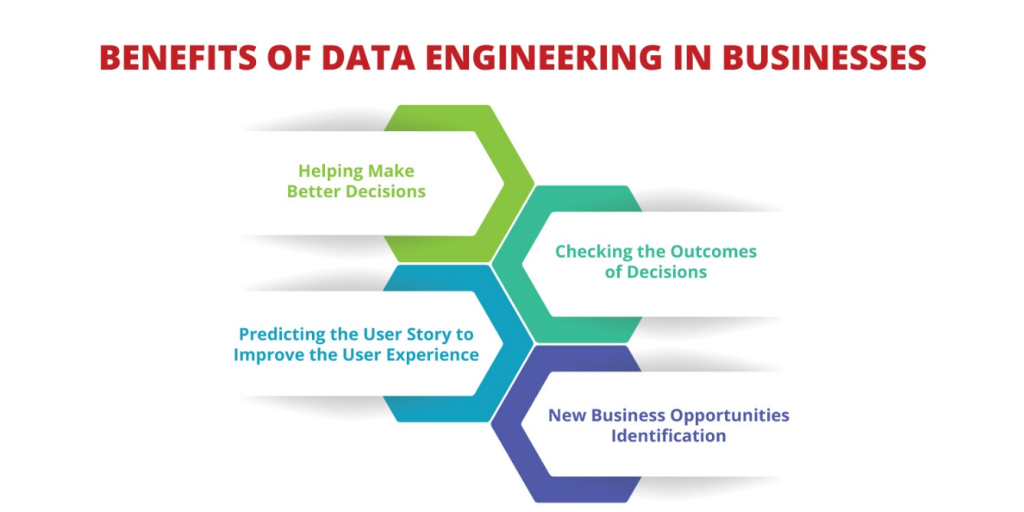Why Data Engineering Is Key to Digital Transformation?

Futurism Technologies
February 16, 2024 - 1.2K
5 Min Read
The business world is changing faster than ever, and companies are jumping on the “digital train” to keep up. This means using some or the other advanced technology in everything they do, from how they work to how they serve customers. But there’s a secret weapon behind this digital revolution: data engineering.
Data engineering involves the meticulous design and management of data workflows and infrastructure, enabling organizations to collect, store, process, and analyze vast amounts of data. As businesses embark on their digital transformation journey, the role of data engineering becomes paramount, ensuring that data is not only accessible but also meaningful, secure, and ready to drive innovation.

If your company is on the digital journey, remember: data engineering is the key to unlocking the power of information and staying ahead of the game!
Read also: 2024 Digital Transformation Guide: Revolutionizing Businesses in the AI Era
What exactly is Data Engineering?
Data engineering is the foundation upon which companies build their information infrastructure. It involves a comprehensive suite of practices aimed at managing the data lifecycle – from raw data collection and storage to its processing and analysis. Data engineers are the architects behind the scenes, creating robust, scalable, and efficient data pipelines that feed into analytics and business intelligence tools, paving the way for informed decision-making and strategic planning.
The scope of data engineering spans several key processes:
- Data Collection: Gathering data from various sources, including internal databases, social media, and IoT devices. Technologies like Apache Kafka and Fluentd are widely used for ingesting data in real-time from diverse sources.
- Data Storage: Designing data warehousing solutions that are secure, scalable, and optimized for performance. Platforms such as Amazon Redshift, Google BigQuery, and Snowflake offer cloud-based solutions that support the vast data needs of modern businesses.
- Data Processing: Transforming raw data into a structured format through cleansing, validation, and categorization. Apache Spark and Apache Hadoop are key technologies for big data processing, offering powerful frameworks for handling vast datasets efficiently.
- Data Analysis: Employing advanced analytics and machine learning algorithms to derive insights that can inform business strategies. Tools like TensorFlow for machine learning models, and data analysis platforms such as Tableau, Power BI, and Looker help turn data into actionable intelligence.
These processes are critical in translating raw data into actionable intelligence, enabling businesses to unlock the full potential of their digital transformation efforts. With the right data engineering strategies, companies can achieve operational efficiency, enhance customer experiences, and foster innovation.
Data Engineering and Digital Transformation
Data engineering is not just a technical discipline; it is a strategic asset in the digital transformation playbook. With efficient data analytics, it lays the groundwork for businesses to become truly data-driven. This transformation goes beyond mere technology adoption, involving a fundamental shift in how data is leveraged to make decisions, innovate, and deliver customer value.
For example, retailers can leverage data engineering solutions to revolutionize their supply chain management. By implementing a sophisticated data pipeline that integrates real-time inventory data, customer demand forecasts, and supplier performance metrics, retailers can optimize their stock levels across thousands of products and hundreds of stores, significantly reducing waste while improving customer satisfaction. This strategic application of data engineering not only enhances operational efficiencies but also enables the retailers to adapt swiftly to market trends and consumer preferences, illustrating the profound impact of data engineering on a retailer’s agility and competitive edge in the digital era.
This transformation goes beyond mere technology adoption, involving a fundamental shift in how data is leveraged to make decisions, innovate, and deliver customer value. It underscores the role of data engineering as a critical enabler of digital transformation, empowering businesses to navigate the complexities of today’s digital landscape with greater precision and insight.
Powering Digital Transformation Through Data
At the core of digital transformation is the ability to rapidly adapt and respond to market changes and customer needs. Data engineering facilitates this by:
- Real-time Insights: With the arrival of streaming data processing technologies, businesses can now make decisions based on real-time data, staying ahead of the curve.
- Fostering Innovation: By providing a flexible and scalable data infrastructure, data engineering supports the exploration of new business models and the creation of innovative products and services.
- Enhancing Customer Experiences: Personalized customer interactions, powered by data analytics, can significantly boost customer satisfaction and loyalty.
Use Cases across Industries
- Retail: Utilizing data engineering to analyze customer behavior and preferences, leading to tailored marketing and improved supply chain efficiency.
- Healthcare: Leveraging data to enhance patient care through predictive analytics and personalized treatment plans.
- Finance: Employing advanced data analytics for risk assessment, fraud detection, and customer service optimization.
Challenges in Data Engineering for Digital Transformation
Despite its vast potential, data engineering encounters several challenges in the context of digital transformation. These include ensuring the accuracy and uniformity of data collected from diverse sources, building systems that can scale with the growth of data volumes, and integrating seamlessly with existing technologies. Moreover, with increasing data breaches and stringent regulations, ensuring the privacy and security of data is paramount.
Emerging Solutions and Strategies
- Data Quality and Consistency: Advanced data governance and quality tools, such as Talend and Informatica, offer sophisticated mechanisms for ensuring data accuracy and consistency across sources. These platforms provide features like automated cleansing, validation, and reconciliation, which help maintain the integrity of data throughout its lifecycle.
- Scalability and Integration: Cloud-native data platforms like Google Cloud Platform, AWS, and Microsoft Azure are revolutionizing the way data infrastructures scale and integrate. These platforms offer elastic scalability, allowing data systems to dynamically adjust resources based on demand, and seamless integration capabilities with a wide array of services and APIs for enhanced interoperability.
- Data Privacy and Security: Emerging technologies such as blockchain and advanced encryption methods are setting new standards for data security and privacy. Blockchain, for example, offers a decentralized and immutable ledger, providing a robust framework for secure data sharing. Meanwhile, encryption techniques like homomorphic encryption allow data to be processed in encrypted form, enhancing privacy without compromising on functionality.
Adopting a Proactive Approach:
Addressing these challenges requires a proactive approach, emphasizing the adoption of cutting-edge technologies and best practices in data management. It also involves fostering a culture of continuous learning and adaptation within organizations, ensuring that data teams are well-equipped to leverage the latest advancements in data engineering.
By embracing these solutions and strategies, businesses can not only navigate the complexities of digital transformation more effectively but also unlock new opportunities for innovation and growth. It underscores the importance of viewing challenges not as roadblocks but as catalysts for advancement and improvement in the digital journey.
Read also: Turning Data into Dollars – AI-Driven Success
Futurism Technologies: Leading the Way
Steering businesses through the digital age with best-in-class AI-powered data engineering solutions. With a strong foundation in AI, product engineering and development, Futurism provides bespoke data engineering solutions that empower businesses to navigate the complexities of digital transformation successfully.
Futurism integrates AI across its data engineering services, enhancing data processing, analysis, and predictive analytics. This approach not only accelerates the extraction of insights from large datasets but also introduces new levels of efficiency and accuracy in predictive analytics, ultimately driving strategic business outcomes.
Takeaway
As we conclude our exploration of the pivotal role of data engineering in digital transformation, it’s clear that this field is not just a technical necessity but a strategic imperative for businesses aiming to thrive in the digital age. The journey, while promising, is fraught with challenges that demand innovative solutions and a proactive approach.
Here are the key takeaways:
- Strategic Importance: Data engineering serves as a critical enabler of digital transformation, driving efficiency, innovation, and customer satisfaction. It’s a strategic asset that goes beyond mere technical support, shaping the future of businesses in the digital landscape.
- Real-time Decision Making: The ability to process and analyze data in real time is transforming the way businesses operate, offering unprecedented agility and competitive advantage.
- Personalization and Innovation: Through data engineering, companies can offer highly personalized experiences to their customers and explore new business models and services, fostering innovation and growth.
- Challenges as Opportunities: While challenges in data quality, scalability, and security are significant, addressing them with emerging technologies and best practices can strengthen digital transformation initiatives, making businesses more resilient and adaptable.
The journey towards digital transformation is continuous and evolving. As such, it’s crucial for businesses to regularly assess their data engineering capabilities and digital transformation readiness. Take the time to evaluate your current strategies, technologies, and practices.
If you need help keeping up, reach out to us.
Subscribe Now!
TRENDING POSTS
-
Futurism Returns to Hannover Messe 2024: Leading the Charge in Industrial and Digital Transformation
-
The Role of Smart Maritime IoT Solutions in Enhancing Maritime Safety
-
Data Integration Unlocked: From Silos to Strategy for Competitive Success
-
Navigating the Shadows: Understanding Zero-Click Attacks in the Digital Age
-
AI Reimagined: Crafting Next-Gen AI Apps with Expert Fine-Tuning
-
Explore Next-Gen Digital Solutions with Futurism at MWC 2024
-
Futurism Unleashes the Technology of Tomorrow at MWC Barcelona 2024
-
Futurism AI: Turning Ideas into Apps at Lightning-Fast Speed
-
Accelerate AI Across Your Enterprise With Futurism AI
-
Futurism to Address the Biggest Security Challenges at RSS 2022
-
Futurism at SelectUSA 2022: Steering the Next Wave of Businesses
-
Futurism to Uplift the MSP Business Community at the MSP Expo 2022
-
Futurism Sets Out to Address the Biggest Security Challenges at the RSA Conference 2022
-
5 Ways to Prepare Your Business for Digital Transformation
-
4 Ways To Win at Digital Transformation on a Shoestring Budget
-
Futurism: Empowering MSPs at the Channel Partners Conference & Expo 2022
-
Why AI in Digital Marketing is the Next Big Thing?
-
Futurism brings ‘Mobile First Digital Transformation’ to the fore at MWC Barcelona 2022
-
Cybersecurity for Rural Hospitals: How can Rural Hospitals become Cyber Smart?
-
Futurism Empowers Rural Health Care Community at the AHA Rural Health Care Leadership Conference
-
The Biggest Problem With Cybersecurity In Healthcare Sector, And How IBM QRadar Can Fix It?
-
How IBM MaaS360 is Revolutionizing Endpoint Security in the Healthcare Industry?
-
Futurism to Present its MSP Partner Program at the Channel Partners Conference & Expo 2021
-
EndPoint Security in Healthcare Matters and IBM MaaS360 Can Help
-
How AI Will Enable Faster Adaptation of Digital Transformation
-
How Is Digital Modernization Important In Supplier On-Boarding?
-
Top 10 Email Marketing Tips for This Holiday Season
-
Benefits of using ERP Software for Energy and Gas Industries


